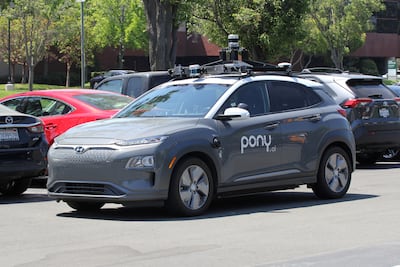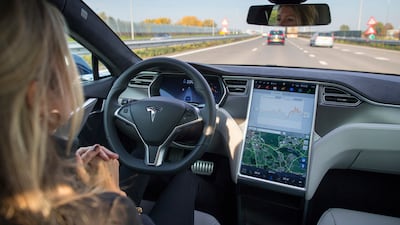Drivers behind the wheel of a self-driving car should not be legally liable for crashes, a report published in the UK on Wednesday suggested.
And the person at the wheel should not even be called the driver any more, merely the user in charge, according to the report tackling the legal implications of the future of driving.
Legal reforms are needed that mean the person in the driving seat of a self-driving car would be immune from prosecution “if anything goes wrong”, such as speeding or running a red light, the report said.
Under the plan, the company or body that obtained authorisation for the technology would instead face sanctions.
The report, by the Law Commission of England and Wales and the Scottish Law Commission, laid out differences between features that assist drivers, such as adaptive cruise control, and self-driving autonomous cars that will be the key to legal liability in the new vehicles.
Scottish Law Commissioner David Bartos said the proposals focused on “ensuring safety and accountability while encouraging innovation and development".
Whoever is in the driving seat – a term that remains in use even if it becomes outdated – would remain responsible for other duties such as obtaining insurance, checking loads and ensuring child passengers are wearing seat belts.
The report also recommended that passenger services conducted by self-driving vehicles are accessible, particularly to older and disabled people.
Transport Minister Trudy Harrison said the development of self-driving vehicles in the UK “has the potential to revolutionise travel, making everyday journeys safer, easier and greener".
“This government has been encouraging development and deployment of these technologies to understand their benefits,” she said.
“However, we must ensure we have the right regulations in place, based upon safety and accountability, in order to build public confidence.”
Fully driverless car are not yet legally permitted in the UK, but autonomous features are being developed by car makers.
In April last year the Department for Transport announced it would allow hands-free driving in vehicles with lane-keeping technology on congested motorways, at speeds of up to 37 miles an hour (59.5kph).
Matthew Avery, chief research strategy officer at road safety organisation Thatcham Research, which contributed to a consultation for the report, warned that the transition to self-driving cars was “fraught with risk".
“In the next 12 months, we're likely to see the first iterations of self-driving features on cars in the UK,” he said.
“It's significant that the Law Commission report highlights the driver's legal obligations and how they must understand that their vehicle is not yet fully self-driving.”

The manufacturers of autonomous cars have been testing vehicles over several years as the tech moved from science fiction to fact.
There have also been crashes and deaths that highlighted the legal minefield the new vehicles bring with them.
Six children and an adult were taken to hospital with injuries after a car hit pedestrians in a school car park in Sussex, southern England last August.
In California, prosecutors filed two counts of vehicular manslaughter against the driver of a Tesla on autopilot that ran a red light, slammed into another car and killed two people in 2019.
Nicholas Paines, QC, Public Law Commissioner, said Britain had an “unprecedented opportunity to promote public acceptance of automated vehicles".
It will be for the UK, Scottish and Welsh Governments to decide whether to accept the report's recommendations.












